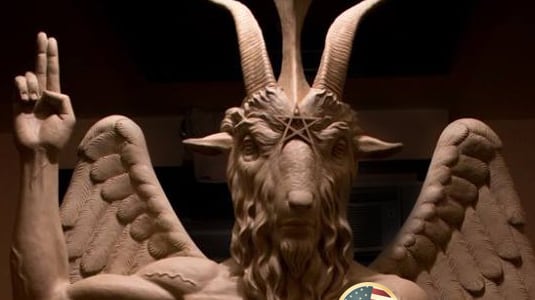What does a 17th century-set movie about witchcraft have to do with the 2016 presidential election, Ted Cruz, and the future of America? Everything, according to the Satan-celebrating leaders of the Satanic Temple.
The “non-theistic religious organization” has thrown its support behind The Witch, the Sundance horror hit that opens this weekend with the tale of a teenage Pilgrim girl suspected of consorting with the Devil in isolated, Puritanical New England.
“We have people running for office, leaders in our communities, who still reference and somewhat fetishize this period of early America,” Satanic Temple national spokesperson Jex Blackmore told The Daily Beast.
“They often say, ‘America was founded on these Christian values’—and I think you see [in The Witch] that what happens in this very religious, almost pre-American era is that religious values were quite destructive. It pulls on an American history that is something of a black sheep period that we gloss over and brings it to the forefront to ask: Is this something we really want to return to?”
With nearly 100,000 reported members worldwide and a vested interest in both the outcome of November’s election and the future of America, the Satanic Temple, which has members across the globe, is keeping a close watch on crusading Christian GOP candidate Cruz.
“We’re very interested in Ted Cruz’s campaign since he often discusses religious liberty,” said Blackmore, although she was quick to emphasize that the Satanic Temple has yet to officially endorse any White House hopeful on either side of the aisle.
Such an endorsement would understandably conjure confusion, explained Blackmore, who also serves as director of the Temple’s Detroit chapter. As a religious organization built on securing individual liberties in the name of the Dark One—at least, the concept of Satan as an icon of rebellion and opposition to institutionalized religious oppression—the organization is prepared to take on any prospective POTUS, be it Cruz or Trump or Hillary.
Cruz in particular has been courting the evangelical vote by playing up his Southern Baptist faith with a scripture-quoting strategy that scored him a big win in Iowa. Religious devotion, meanwhile, has become a form of campaign currency not just for Cruz but also rivals like Donald Trump, who has loudly cast stones at Cruz’s piety and yesterday lashed out at the Pope for calling his own Christianity into question.
But Cruz has played up his Christian card more than his opponents—and that’s landed him at the top of the Satanists’ watch list. “That’s really his major platform—he appeals to this sort of conservative religious voter,” said Blackmore. “We’re really interested in his interpretation of what religious liberty means as one that seems to come across as only applying to Christians pretty exclusively, and how he uses that rhetoric to push an agenda that opposes access to health care for women, for example, or how he continues to promote the concept of traditional marriage on a religious platform as being one of exclusively his own views.”
“I certainly think we’re going to be responding as those kinds of issues continue to come up in the election year,” she said, "regardless of who’s nominated in the GOP or Democratic Party.”
The control over female bodies is another theme of The Witch that’s ringing alarmingly true today as states and presidential candidates battle over the defunding of Planned Parenthood. The film’s heroine finds herself increasingly victimized by a patriarchal Christian system that seeks to control her actions, thoughts, body, and budding sexuality. She has no recourse for the repressive punishment that rains down from her extremist father, who bellows one of the film’s memorable lines: “Did ye make some unholy bond with that goat?”

“I think Donald Trump has a lot of opinions that oppose personal bodily autonomy, and a lot of his positions are contrary to fact and science,” said Blackmore. “Bodily autonomy and basing our decisions off of what we know best about the world from a scientific understanding [are central tenets of the Satanic Temple], so to oppose that is to oppose Satanic philosophy.”
Blackmore considered where Trump might fall on the Satanic spectrum: “I think from that perspective, the Satanic values don’t fall in line with what Donald Trump promotes.”
In 2013, the Satanic Temple made national headlines by giving an unwanted Satanic endorsement to Florida Gov. Rick Scott’s bill allowing prayer in public schools. Later that year, members of the Temple staged a gay blessing over the grave of the mother of Westboro Baptist Church founder Fred Phelps.
Last year, the organization publicly erected a statue of Baphomet in response to Oklahoma’s Ten Commandments monument, arguing yet again that if Christian beliefs were permitted to seep into American public and political life, so too must all religious beliefs.
“We are a non-theistic religious organization,” explained Blackmore. “To us what that means is we have all the defining features of a religion including a set of shared values and tenets, a history and aesthetic, a ritual practice, but we have all of those things minus a god element.”
“We do feel very strongly that religion can and should be divorced from superstitious beliefs, that having a superstitious belief doesn’t mean that your deeply held tenets are any less valuable under the law or in your own community. If we say that supernaturalists are the only ones who get exemption for their beliefs, then we have a big problem,” she argued.
Many critics dismiss the Satanic Temple as a gimmick, but Blackmore argues that their faith is as true as any other religious group’s.

“We absolutely believe that we are Satanists, that we fit the Satanic description that’s been employed culturally and historically, and as such we are using that as a framework for our own life,” she said. “It’s crazy because when you think about Scientology, which has been accepted as this non-exempt religious organization, you start to see where power and money come into play in dictating and forming our concepts of what is okay and acceptable as a religion or religious group.”
As social advocates, the Satanists—who count cult filmmaker John Waters among their card-carrying members, Blackmore adds—are urging members and the uninitiated alike to adhere to another core tenet of the Satanic Temple: “Beliefs should conform to our best possible scientific understanding of the world.”
That means wanton misinformation thrown around during the election cycle is inherently anti-Satanic. “When you have people attacking global warming, for example, you have people pandering to a base that’s uninformed using false information,” Blackmore offered. “And that’s offensive to us because we think that our world should be formed by policies that make sense and aren’t based in corporate interests.
More recently, the Satanic Temple launched a Sabbat Cycle program designed to encourage engagement in and awareness of local politics. The fight against apathy in particular, Blackmore said, “is something that has been part of this Satanic subculture. The metal subculture, the punk subculture—people expressing their discontent but really doing nothing about it.”
She advised vetting presidential candidates by the quality of the information they espouse, and where they source it.
“When we have people who say that they value life but they want to bomb Syria, for example, and do it in a very careless way, I think we have to be careful that we’re not getting too emotional and reacting to propaganda, that we are an educated base and don’t allow our candidates to promote misinformation, because it’s dangerous,” Blackmore said, “and we deserve better as voters.”






